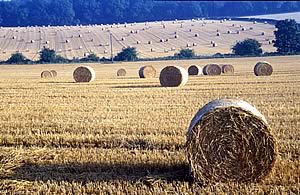 |
|||||||||
|
|||||||||||||||||||
|
|
Agriculture is Essential for Facing Climate Change 2009-06-03 Agricultural mitigation in developing countries can make farming more resilient to the vagaries of climate change and can also reduce hunger and poverty, FAO said in a policy brief for climate change negotiators currently meeting in Bonn/Germany.
"If agriculture in developing countries becomes more sustainable, if it increases its productivity and becomes more resilient against the impact of climate change, this should help to reduce the number of currently around one billion hungry people and offer better income and job opportunities," said Alexander Mueller, FAO Assistant Director-General. "Millions of poor farmers around the globe could help in reducing greenhouse gas emissions," said Peter Holmgren, FAO focal point for the UN climate change negotiations. "But this requires massive investments and information — to change unsustainable farming methods and to train farmers in mitigation practices. A new global climate agreement, to be adopted in Copenhagen in December, therefore needs to include agriculture," Holmgren added. Current global funding arrangements such as the Kyoto Protocol's Clean Development Mechanism are not reaching farmers in poor countries, Holmgren said. New and more flexible financing mechanisms are needed that offer incentives to farmers, including smallholders, so that they may participate in greenhouse gas emission reductions and removals. The scope of the Clean Development Mechanism, for example, could be expanded in order to include reduction of emissions from deforestation and forest degradation, wetlands, croplands and grasslands, in order to realize the high potential for sequestering carbon in soils and above ground biomass. Funding for climate change activities in agriculture in developing countries should be new and additional and should be clearly separate from official development aid, while opportunities to use funding from different sources in mutually reinforcing ways should be fully exploited. Agriculture — a source and a sink Agriculture is a major source of greenhouse gasses accounting for 14 percent of global emissions. Land use changes such as deforestation account for an additional 17 percent. Between 1990 and 2005, emissions by agriculture in developing countries increased by around 30 percent and are expected to rise further. Soil carbon sequestration through reduced tillage, improved grassland management and restoration of degraded lands, forms the major part of mitigation potential from agriculture. Other mitigation options include more efficient use of fertilizer, improving water and rice management planting trees, altering forage and sustainable use of animal genetic diversity.
|
||||||||||||||||||

|
|
||||||||||||||||||
| home | agri-services | pedigree
pen | news | dairy | beef | machinery quota | property | organisations | site map |
|||||||||||||||||||

